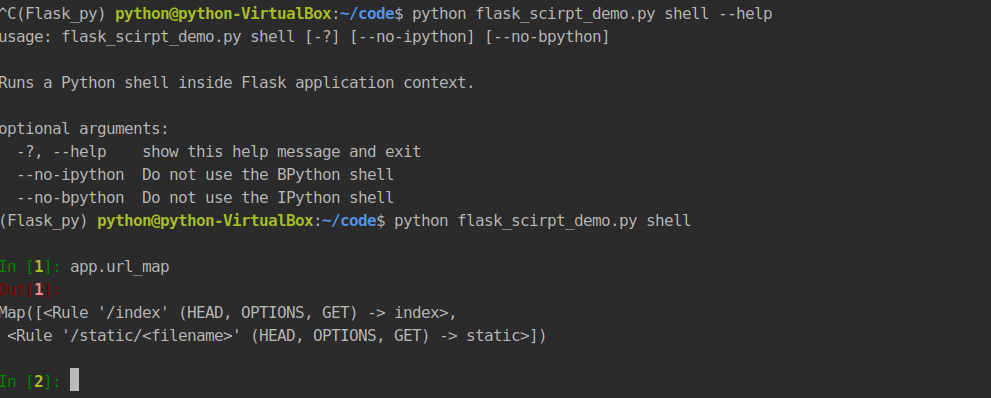在学习扩展之前,先介绍几个概念,自己的思路还不是很清晰,所以暂时还没办法做过多的讲解
请求上下文与应用上下文
请求上下文 (request context)
-
request
-
session
应用上下文(application context)
-
current_app
-
g (处理请求时,用于临时存储的对象,每次请求都会重设这个变量)
请求钩子
请求钩子是通过装饰器的形式实现,Flask支持如下四种请求钩子:
-
before_first_request:在处理第一个请求前运行。 @app.before_first_request
-
before_request:在每次请求前运行。 @app.before_request
-
after_request(response):如果没有未处理的异常抛出,在每次请求后运行。 @app.after_request
-
teardown_request(response):在每次请求后运行,即使有未处理的异常抛出。 @app.teardown_request 注释:需要在生产模式下,也就是debug=False的时候
简单的示例:
# coding:utf-8 from flask import Flask app = Flask(__name__) @app.route("/index") def index(): print("index 执行了") return 'index page' @app.before_first_request def before_first_request_function(): """在第一次请求处理之前先被执行""" print("before first request function 执行了") @app.before_request def before_request_function(): """在每次请求之前都被执行""" print("before request function 执行了") @app.after_request def after_request_function(response): """在每次请求(视图函数处理)之后都被执行, 前提是视图函数没有出现异常""" print("after request function 执行了") return response @app.teardown_request def teardown_request_function(response): """在每次请求 (视图函数处理)之后都被执行, 无论视图函数是否出现异常,都被执行, 工作在非调试模式时 debug=False""" print("teardown request function 执行了") if __name__ == '__main__': app.run(host='0.0.0.0')
# 展示结果 (Flask_py) python@python-VirtualBox:~/code$ python hook_demo.py * Running on http://0.0.0.0:5000/ (Press CTRL+C to quit) before first request function 执行了 before request function 执行了 index 执行了 after request function 执行了 teardown request function 执行了 127.0.0.1 - - [24/Jul/2019 19:39:20] "GET /index HTTP/1.1" 200 -
Flask-Script 扩展脚本
安装
pip install Flask-Script
添加启动脚本Manager
# coding:utf-8 from flask import Flask from flask_script import Manager # 启动命令的管理类 app = Flask(__name__) # 创建Manager管理类的对象 manager = Manager(app) @app.route("/index") def index(): return "index page" if __name__ == '__main__': # app.run(debug=True) # 通过管理对象来启动flask manager.run()
在终端启动之前我们可以通过help查看帮助信息
(Flask_py) python@python-VirtualBox:~/code$ python flask_scirpt_demo.py --help usage: flask_scirpt_demo.py [-?] {shell,runserver} ... positional arguments: {shell,runserver} shell Runs a Python shell inside Flask application context. runserver Runs the Flask development server i.e. app.run() optional arguments: -?, --help show this help message and exit
可以看出有两个命令可供我们选择,选定runserver再次通过help来查看帮助信息
(Flask_py) python@python-VirtualBox:~/code$ python flask_scirpt_demo.py runserver --help usage: flask_scirpt_demo.py runserver [-?] [-h HOST] [-p PORT] [--threaded] [--processes PROCESSES] [--passthrough-errors] [-d] [-D] [-r] [-R] Runs the Flask development server i.e. app.run() optional arguments: -?, --help show this help message and exit -h HOST, --host HOST -p PORT, --port PORT --threaded --processes PROCESSES --passthrough-errors -d, --debug enable the Werkzeug debugger (DO NOT use in production code) -D, --no-debug disable the Werkzeug debugger -r, --reload monitor Python files for changes (not 100{'const': True, 'help': 'monitor Python files for changes (not 100% safe for production use)', 'option_strings': ['-r', '--reload'], 'dest': 'use_reloader', 'required': False, 'nargs': 0, 'choices': None, 'default': None, 'prog': 'flask_scirpt_demo.py runserver', 'container': <argparse._ArgumentGroup object at 0x7f2a3e8db290>, 'type': None, 'metavar': None}afe for production use) -R, --no-reload do not monitor Python files for changes
启动并且指定 host:0.0.0.0 port :12345 并且通过本地ip或者127.0.0.1访问
(Flask_py) python@python-VirtualBox:~/code$ python flask_scirpt_demo.py runserver -h 0.0.0.0 -p 12345 * Running on http://0.0.0.0:12345/ (Press CTRL+C to quit) 127.0.0.1 - - [24/Jul/2019 20:00:43] "GET /index HTTP/1.1" 200 - 127.0.0.1 - - [24/Jul/2019 20:00:43] "GET /favicon.ico HTTP/1.1" 404 -
展示结果:

除了runserver这个选项还有一个就是shell这个选项

就是进入了ipython这个编译器在这里你不需要导入flask_script_demo这个模块就可以直接是用它
